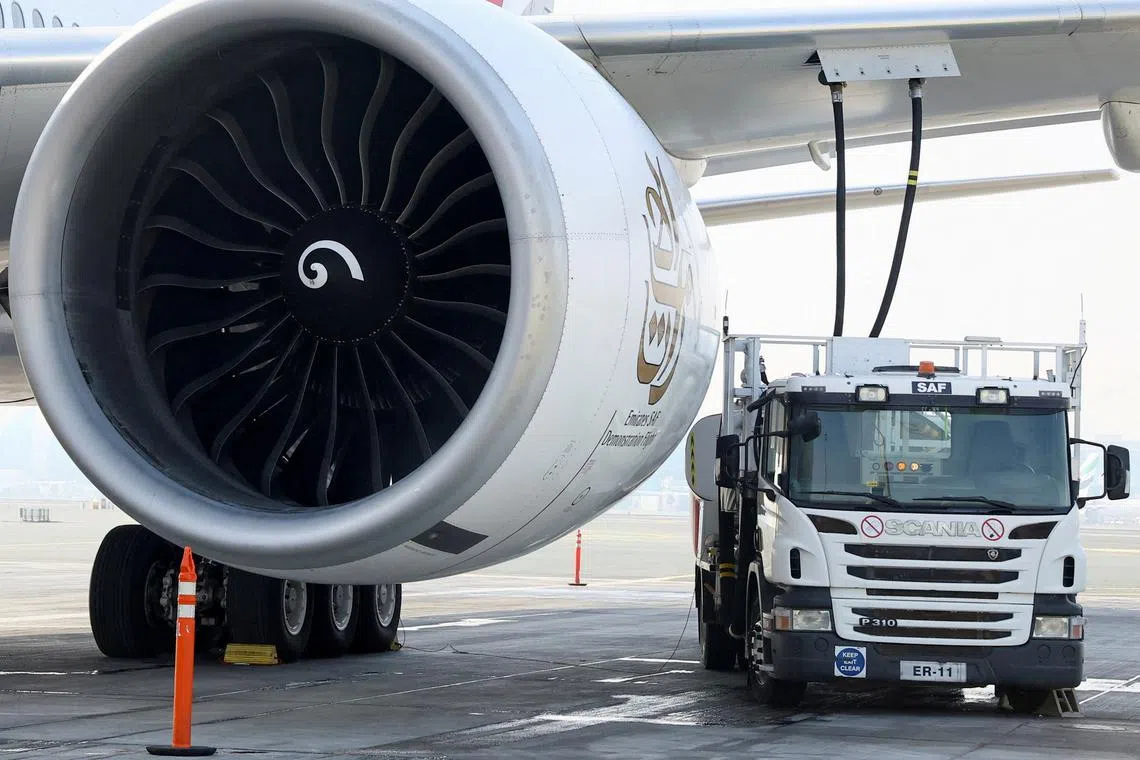Government support needed for aviation industry to achieve sustainability goals: Iata
Sign up now: Get ST's newsletters delivered to your inbox

Iata believes there is urgency to put in a global credit system for airlines to book and claim the benefit of using fuel from renewable sources.
PHOTO: REUTERS
ISTANBUL - While the production of fuel from renewable sources is increasing, governments have to step in to support the aviation industry’s transition towards sustainable energy by boosting the development of sustainable aviation fuel.
Incentives and policies will help the aviation industry have sufficient supply of such fuel to meet its target of having net-zero carbon emissions by 2050, said the International Air Transport Association (Iata) at its annual meeting on Tuesday in Istanbul, Turkey.
How closely the industry can keep to its path towards its overall decarbonisation goal is significantly influenced by how airlines can switch to fuel made from renewable sources instead of conventional jet fuel.
Iata director-general Willie Walsh said the aviation industry is counting on access to such fuel to provide 62 per cent of the reduction in carbon emissions needed to achieve its 2050 target.
“The expected production increase is extremely encouraging. Seeing this, we need governments to act to ensure that sustainable aviation fuel gets its fair production share.”
Production tripled in 2022 to 300 million litres from the year before, but this represented 0.1 per cent of what the industry needs.
Mr Walsh said: “While critics of our industry dismiss that figure as irrelevant, it’s important to remember that airlines used every single drop costing almost US$350 million (S$472 million). With the right supportive policies, reaching 30 billion litres by 2030 is challenging but achievable.”
The 2030 figure assumes that such fuel will account for 30 per cent of the projected total renewable fuel supply capacity. This represents 6.6 per cent of the 450 billion litres of annual production capacity needed in 2050.
Iata’s estimated fuel production capacity takes into account over 130 renewable fuel production projects announced by more than 85 producers across 30 countries.
Typically, production sites can produce other types of fuel such as renewable diesel. This means that producers have to see the value of committing to aviation fuel over the alternatives.
To ramp up production capacity, Iata is calling on governments to encourage the adoption of different methods of making such fuels.
Current projections are that 85 per cent of sustainable aviation fuel made over the next five years will be produced using one single method which relies on waste fat, oil and grease feedstocks as raw materials. Finnish energy giant Neste’s refinery in Tuas South is the world’s largest production facility
This is one of nine recognised ways to create sustainable aviation fuel. Not all are as commercially attractive or immediately ready for producers to embark on in a significant manner.
Having different ways of producing sustainable aviation fuel and diversifying the type of raw materials involved would also open up new opportunities that suit different geographical locations, which can create more jobs and boost economies, Mr Walsh noted.
Iata wants policies surrounding the deployment of sustainable aviation fuel to be globally consistent to create a level playing field for producers and investors to commit to this fuel.
Iata believes there is urgency to put in a global credit system for airlines to book and claim the benefit of using fuel from renewable sources.
This means that an airline can opt to buy globally recognised credits but the fuel does not have to be used on its aircraft. This would avoid the need to transport the fuel over long distances to bring it to the aircraft if such fuels are not produced nearby.
Additionally, doing so also enables the fuel producers to increase capacity sufficiently to achieve the economies of scale needed to drive down cost.



